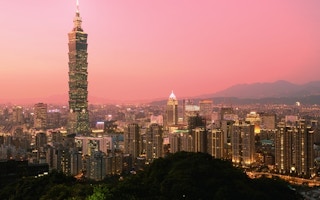Taiwan is kicking its green initiatives into high gear as the country is set to host the Eco-Products International Fair (EPIF) for the first time this March 2014.
To continue reading, subscribe to Eco‑Business.
There's something for everyone. We offer a range of subscription plans.
- Access our stories and receive our Insights Weekly newsletter with the free EB Member plan.
- Unlock unlimited access to our content and archive with EB Circle.
- Publish your content with EB Premium.
The Asian Productivity Organization (APO), a Tokyo-based non-profit intergovernmental group, picked the island-country to lead the annual environmental exhibition in the region, since Taiwan placed third in the sustainable development rankings in this year’s World Competitiveness Yearbook.
This reflected Taiwan’s “commitment to create a green society”, said Martina Abdul Aziz, APO information and public relations officer, to Eco-Business.
Just recently, Taiwan concluded the fifth edition of its Taiwan International Green Industry Show, along with the third Taiwan International Smart Green City Expo, which included the Taiwan International Smart Green City Summit.
These events, organised by Bureau of Foreign Trade, the Ministry of Economic Affairs (MOEA) and implemented by the Taiwan External Trade Development Council (TAITRA), served as a platform for the private sector, academe and government to promote their green projects, products and services.
“
The APO is collaborating with Taiwan to provide a platform to raise environmental awareness, encourage greening of supply chains, support growing green markets, and involve the public in creating a better environment through the use of eco-products, eco-technologies, and eco-services
Martina Abdul Aziz, APO information and public relations officer
It also underscored the role of green industries in strengthening the economy and national development.
According to TAITRA, Taiwan’s green trade exports accounted for 13.5 per cent of total exports in 2012, which is equivalent to US$40.5 billion.
The 2014 EPIF, with a theme of “Go Green, Act Greener”, will build on these significant advancements with an even stronger regional focus.
Together with the China Productivity Center, the MOEA and TAITRA will be the organisers behind the four-day event to be held at the Taipei World Trade Center and the Taipei International Convention Center. A total of 20,000 visitors from the public and trade sector are expected to attend.
Walter MS Yeh, TAITRA executive vice president, said, “Holding EPIF 2014 in Taiwan will provide firms with many green business opportunities and partnerships with companies from 19 APO member countries.”
The APO, which is pushing for green productivity in the region, considers Malaysia, Thailand, Singapore, Vietnam, Indonesia, the Philippines, and India as some of its members. These countries have all previously hosted the EPIF.
According to Aziz, “The APO is collaborating with Taiwan to provide a platform to raise environmental awareness, encourage greening of supply chains, support growing green markets, and involve the public in creating a better environment through the use of eco-products, eco-technologies, and eco-services.”
As such, Taiwan would be able to leverage on its growing green expertise and boost the green productivity initiatives of the organisation in the Asia Pacific region, she added.
Currently, the government of Taiwan provides incentives for green practices and green purchases, such as subsidies for installing solar panels at home and rebates for buying electric scooters and energy-saving home appliances, TAITRA told Eco-Business.
It also helps that Taiwan is a global manufacturing leader in the ICT industry, which is the foundation of the country’s burgeoning green industries. The organisers specially noted the Taiwanese solar panel and LED lighting businesses. The former accounted for 19 per cent of the global market share in 2012, while the production of LED illumination and modules had a production value of US$6.4 billion in the same year.
In addition, the local and the central governments are assisting other Taiwanese green enterprises to export by encouraging them to join or including them in international exhibitions both in the country and overseas.
Compared to the United States and Europe, however, the Asia Pacific region still has “a long way to go” to mature and become competitive in the green and low-carbon market, Aziz stressed.
“Asia Pacific countries are at different stages of green development and economic growth. APO member economies such as Japan, Taiwan, the Republic of Korea, and Singapore are advanced in green terms, while others have made serious efforts to develop green trade in their countries with the help of the APO.”
This upcoming EPIF will help address the gap and increase the competitiveness of member nations, especially in tapping the “massive” growth potential, she noted.
Developing and producing innovative products with eco-friendly materials or which are energy efficient advance sustainable lifestyles and “mitigate the effects of climate change by reducing carbon emissions”.
Yeh said that the market for low-carbon and resource-efficient industry is projected to triple in size and reach US$ 2.2 trillion by 2020, based on a United Nations Environment Programme (UNEP) report released earlier this May.








